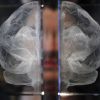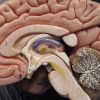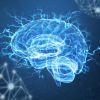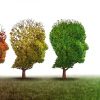-
 +8 +1
+8 +1You’re a different person at 14 and 77, the longest-running personality study ever has found
Look at a photo of yourself as a teenager and, mistaken fashion choices aside, it’s likely you see traces of the same person with the same personality quirks as you are today. But whether or not you truly are the same person over a lifetime—and what that notion of personhood even means—is the subject of ongoing philosophical and psychology debate. The longest personality study of all time, published in Psychology and Aging and recently highlighted by the British Psychological Society, suggests that over the course of a lifetime...
-
 +24 +1
+24 +1How Poverty Changes the Brain
You saw the pictures in science class—a profile view of the human brain, sectioned by function. The piece at the very front, right behind where a forehead would be if the brain were actually in someone’s head, is the pre-frontal cortex. It handles problem-solving, goal-setting, and task execution. And it works with the limbic system, which is connected and sits closer to the center of the brain. The limbic system processes emotions and triggers emotional responses, in part because of its storage of long-term memory.
-
 +17 +1
+17 +1Why Can Some Blind People Process Speech Far Faster Than Sighted Persons?
Books fly from the shelf as Superman fans the pages in a blur devouring the information at blinding speed. Superhuman mental powers, including his extraordinary sense of hearing and blazing speed-reading, are as vital to Superman as his bullet-beating velocity and steel-bending strength. But it seems Superman isn't the only being with the gift of quickness.
-
 +22 +1
+22 +1Starting school 15 minutes later offer significant benefits for kids, says study
It sounds like a child’s dream come true: starting school later may be more beneficial for kids than forcing them to embrace the early morning grind. According to a study published in the journal Sleep Medicine, delaying school start time by just 15 minutes could do wonders for adolescent mental health—and it all has to do with preventing sleep deprivation.
-
 +20 +1
+20 +1Why Do Intelligent, Well-Educated People Still Believe Nonsense?
Last night for the third time in as many months I found myself explaining to someone raised outside of a devoutly religious environment that religious people are not stupid simply because they believe nonsensical things. Each of the three times I’ve had this conversation it’s been with a different person whose professional life has increasingly come to focus on critiquing religion. Each time I’ve encountered the same bewilderment, and each time I’ve covered the same ground in an attempt to explain how and why some people who are very intelligent can...
-
 +21 +1
+21 +1The complexity of social problems is outsmarting the human brain – by Robert Burton
When mulling over possible reasons for the alarming nastiness associated with the recent presidential election in the United States, I am reminded of my grade-school bully. Handsome, often charming, superbly athletic, the bully (let’s call him Mike) would frequently, usually without clear provocation, kick, punch and shove other classmates. Fortunately, for reasons not apparent at that time, he never bothered me.
-
 +20 +1
+20 +1Study: Better memory makes people tire of experiences more quickly
We're fickle creatures. At least if we can remember to be, according to a new study led by a University of Kansas researcher of marketing and consumer behavior. "People with larger working memory capacities actually encode information more deeply," said Noelle Nelson, lead author of the work, which was published in the Journal of Consumer Research. "They remember more details about the things they've experienced, and that leads them to feel like they've had it more. That feeling then leads to the 'large-capacity' people getting tired of experiences faster."
-
 +16 +1
+16 +1Scientists say religious fundamentalism could be caused by a brain injury
Suffering a brain injury can make people more religious, scientists have found. Researchers from Northwestern University in Illinois, USA, found patients who had a brain trauma were less willing to accept new ideas and became more extreme in their religious beliefs. The study, published in the journal Neuropsychologia, found that lesions in a part of the brain called the ventromedial prefrontal cortex were linked to higher levels of religious fundamentalism.
-
 +12 +1
+12 +1The everyday habits that reveal our personalities
One reason that personality is such an important psychological concept is because of what it tells us about the kind of lives we’re likely to lead. For example, if you are very conscientious then you’re more likely to enjoy good physical health and more harmonious relationships; extroverts are happier; highly neurotic people experience more mental health problems; open-minded people command higher earnings; and, just as you’d expect, more ‘agreeable’ people are also usually popular and have lots of friends.
-
 +27 +1
+27 +1Boredom Is Good for You
Boredom has, paradoxically, become quite interesting to academics lately. The International Interdisciplinary Boredom Conference gathered humanities scholars in Warsaw for the fifth time in April. In early May, its less scholarly forerunner, London’s Boring Conference, celebrated seven years of delighting in tedium. At this event, people flock to talks about toast, double yellow lines, sneezing, and vending-machine sounds, among other snooze-inducing topics.
-
 +4 +1
+4 +1What Is Reflective Reasoning? | Nick Byrd
Last week I was talking about intuition. I think of intuition as — among other things — an unconscious and automatic reasoning. The opposite of that would be a conscious and deliberative reasoning. We might call that reflective reasoning. In this post I want to talk about reflective reasoning. How does it work? And why does it work? And — spoiler alert — why does it sometimes not work?
-
 +2 +1
+2 +1How Rational is our Rationality?
If you calculate a tip when you’re drunk, you should think of yourself as taking a belief-gamble – you’re forming a belief in a way that gives you a 50% shot at getting things right and a 50% shot at getting things wrong. This is the equivalent of guessing. Since the way in which we care about the accuracy of our beliefs prohibits guessing, this way of caring about accuracy also prohibits forming beliefs while drunk.
-
 +14 +1
+14 +1Why religious people 'cling' to beliefs even when contradicted by evidence
Religious people "cling" to certain beliefs in the face of evidence because those views are closely tied to their moral compasses, new studies have suggested. Dogmatic individuals hold confidently to their faith even when contradicted by experts because those beliefs have "emotional resonance," researchers said. In contrast, militant atheists struggle to see anything positive about religion because their brains are dominated by analytical thinking, scientists found.
-
 +13 +1
+13 +1The Speed in Which You Perceive The World Can Be Altered With a Video
The speed in which you see moving objects around you, can be shifted up or down with the help of a stimulus such as a video. In their study, Visual adaptation alters the apparent speed of real-world actions, researchers from University of Lincoln and University of Stirling have shown that the perceived speed of a moving object can be altered with a stimulus, such as an adapting video, which was used in their experiment.
-
 +26 +1
+26 +1How your mind protects you against hallucinations
More than 300 years ago, the philosopher René Descartes asked a disturbing question: If our senses can’t always be trusted, how can we separate illusion from reality? We’re able to do so, a new study suggests, because our brain keeps tabs on reality by constantly questioning its own past expectations and beliefs. Hallucinations occur when this internal fact-checking fails, a finding that could point toward better treatments for schizophrenia and other psychiatric disorders.
-
 +20 +1
+20 +1Your Brain Really Can Form New Memories While You Sleep
A sleeping brain can form fresh memories, according to a team of neuroscientists. The researchers played complex sounds to people while they were sleeping, and afterward the sleepers could recognise those sounds when they were awake. The idea that humans can learn while asleep, a concept sometimes called hypnopaedia, has a long and odd history. It hit a particularly strange note in 1927, when New York inventor A. B. Saliger debuted the Psycho-phone. He billed the device as an "automatic suggestion machine."
-
 +21 +1
+21 +1Feeling bad about feeling bad can make you feel worse
Pressure to feel upbeat can make you feel downbeat, while embracing your darker moods can actually make you feel better in the long run, according to new UC Berkeley research. “We found that people who habitually accept their negative emotions experience fewer negative emotions, which adds up to better psychological health,” said study senior author Iris Mauss, an associate professor of psychology at UC Berkeley.
-
 +22 +1
+22 +1Silicon Valley is obsessed with meditation, and there’s new evidence it changes the brain for the better
The idea of sitting in a quiet room doing nothing for a few minutes each day might sound absurd — unless you understand how meditation works. By giving our bustling mind a dedicated break from its day-to-day worries, meditation appears to empower it to run more efficiently. A growing body of research suggests that even a few minutes of a daily mindfulness practice is linked to lower stress levels, more positivity, better focus, and creativity.
-
 +4 +1
+4 +1Analytic thinking undermines religious belief while intelligence undermines social conservatism, study suggests
Religion and politics appear to be related to different aspects of cognition, according to new psychological research. Religion is more related to quick, intuitive thinking while politics is more related to intelligence. The study, which was published in the scientific journal Personality and Individual Differences, found evidence that religious people tend to be less reflective while social conservatives tend to have lower cognitive ability.
-
 +25 +1
+25 +1UCLA neuroscientists use weak electrical signal to stimulate human brain and improve memory
Neuroscientists at the David Geffen School of Medicine at UCLA have discovered precisely where and how to electrically stimulate the human brain to enhance people’s recollection of distinct memories. People with epilepsy who received low-current electrical pulses showed a significant improvement in their ability to recognize specific faces and ignore similar ones.
Submit a link
Start a discussion




















